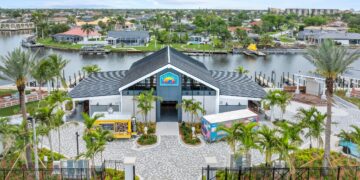Women are building careers for themselves in the construction industry, but there’s still a long way to go.
Females comprise 9.1 percent of the labor force in the construction sector, which had 10.6 million workers in 2017, according to the U.S. Bureau of Labor Statistics. That equates to about 939,000 workers, according to the National Association of Women in Construction (NAWIC).
“We’re still in the minority,” says Riki Lovejoy, owner of RFL Consulting Solutions Inc. in Texas and a past national president of NAWIC. “I don’t know that construction will ever have a women majority, but we will certainly be able to increase that labor force percentage once women realize that the opportunities are there.”
Prior to the recession, the number of women in construction had topped 1 million. But the percentage of females in the field has not moved since 1970, says Catherine Schoenenberger, the president and founder of the Massachusetts-based Stay Safe Traffic Products and the 2017-2018 NAWIC national president.
Women can be a force in the construction industry, she says. It requires changing mindsets, from embracing the #MeToo movement to companies offering benefits, such as flexible schedules and educational opportunities. Those include degree programs and apprenticeships.
“It’s a career path that you can certainly go down and make a livable wage as a woman,” Schoenenberger says.
Women—and men, too—on job sites aren’t comfortable with hearing derogatory comments toward females, and she says the industry is at a turning point as they increasingly speak up about it.
“In my exposure to the women that are actually out there in the field, they’ve been putting up with a lot of crap for a lot of years. And it’s changing now because our younger set is moving in, and they’re not going into the same good ol’ boy network any- more,” says Schoenenberger.
Lovejoy says acceptance is better today than it was in the mid ’80s when she started in construction. Women are earning degrees in construction management, and attrition is causing a shift in the makeup of crews and companies. She’s seeing more college-educated women within general contracting in roles such as project managers, and a bigger representation in trades such as electrical and plumbing. “The girls are coming in with peers from the same college programs, where the boys see what the girls can do. So I think that’s probably the most beneficial thing to breaking that old boys network,” Lovejoy says.
However, finding safety equipment, from hardhats to vests, in the right size for women remains a problem. Some tools are also built for men’s hand sizes. Companies such as Carhartt have been introducing women’s work wear, which is a “big plus,” Lovejoy says.
The NAWIC seeks to increase awareness, as well as encourage and educate women that they are capable of doing the work, especially as the construction industry anticipates a shortage of workers.
“I think it’s really about men and women understanding that, individually, we can accomplish whatever we want to accomplish,” she says. “And that it doesn’t have to be one way or the other.”
As the Southwest Florida NAWIC 297 chapter prepares to host the NAWIC state conference in Fort Myers in October, three female owners of companies in the construction sector shared the lessons they’ve learned.
 Marilyn Santiago
Marilyn Santiago
President, Creative Architectural Resin Products, and chair, Southwest Florida NAWIC 297 chapter
FOUNDED
Began in October 2015, and now operates out of a 6,000-square-foot manufacturing facility in Fort Myers. The company, which has five employees and uses subcontractors, brought in about $500,000 in revenue in 2017.
PRIOR CAREER
The Puerto Rico native worked for more than 25 years in the Hispanic media and entertainment industry, including as president of Latin Entertainment Consultants.
HER PRODUCT
Designs, manufactures and installs resin-based faux architectural trims and accents, such as wood beams, brackets, shutters and outlookers, made from a high-density polymer resin, instead of stone, wood or foam.
HER CLIENTS
Builders, architects and homeowners. About 65 percent of the business is in Southwest Florida, and they also have clients in Tampa, Daytona Beach and Hilton Head, South Carolina.
BEST BUSINESS DECISION
To be ready to bid for business, she put together a pre-qualification package that includes credit references and recommendation letters from people in other trades. “Every company has its own process and its own methods and its own approach. We go for it. Sometimes we win it, sometimes we don’t.” She also has the Minority Business Enterprise (MBE) certification and received start-up assistance from the Florida Small Business Development Center
STATE OF WOMEN IN THE INDUSTRY
“There’s a feeling of empowerment that supersedes everything. That’s a great thing.”
ADVICE
“You don’t have to get down and dirty all the time. You can get creative, and there’s a lot of great opportunities in the construction field.”
Alene Garlick
President, AGT Builders
FOUNDED
Began in 2006 with Garlick and her husband, Matt Thomas, both certified general contractors. The Cape Coral-based company specializes in the building envelope, she says, by providing and installing doors, windows and storefront systems. It has 25 to 35 employees.
PRIOR CAREER
She holds a business degree from the University of Michigan and is a CPA.
FAMILY INSPIRATION
Her father, who was a civil engineer, owned a heavy earth- building company and was a land developer. “I always wanted to get into the business, but at that point in time, he didn’t think the construction climate was good for women. Of course, that always made me want to be involved even more.”
HER CLIENTS
General contractors, developers, colleges, assisted living facilities, homeowner associations, school systems and government agencies. Recent projects include work for DeAngelis Diamond (approximately 1,000 windows and several hundred sliding glass doors and French doors at Amavida in Fort Myers), Suffolk Construction (Naples Square II and The Moorings Building R and clubhouse renovations) and Ashton Woods in Naples.
KEY EARLY STEP
Keeping the fixed costs small. She worked a full-time job when they started the business. “We had to have a supplemental income for a few years.” The company is a Florida certified Minority Business Enterprise (MBE) and certified Disadvantaged Business Enterprise (DBE) by the Lee County Port Authority for the Department of Transportation, which she says also helped attain contracts.
STATE OF WOMEN IN THE INDUSTRY
“I don’t think this business is any tougher than any [other] business I’ve ever been in, but there aren’t a lot of women in it.” She’s hopeful about the impact of construction management degrees. “If a woman was interested in construction when I went to college, they either became an architect or an engineer. Now, there’s that option.”
ADVICE
Make sure to follow through to the very last detail. She’s even opened every one of the thousands of windows in a project to make sure they operate smoothly. If the work is done poorly, you may not have the client anymore, she says.
 Giselle Moreira-Rattis
Giselle Moreira-Rattis
Owner and lead designer, G&R Design Services, and president, Southwest Florida NAWIC 297 chapter
FOUNDED
Began in January 2015 with Moreira-Rattis and her husband, Ricardo Rattis. The company installs items such as backsplashes, laminate and tile. Its sales reached $185,000 in 2017. They have two full-time workers and office space in Fort Myers.
PRIOR CAREER
She previously worked as an office manager for a granite supplier and then worked as a senior estimator. Moreira-Rattis, a mom of three, earned a degree in construction management from San Joaquin Valley College (California) in 2016.
INSPIRATION
Her former boss and mentor, Frinee Mattesich of Avant Construction, who calls Moreira- Rattis “Charley,” after the hurricane. “Sometimes we have to impose [on] people and tell them to do it and motivate them,” Moreira-Rattis says. “With me, it’s the opposite. Many times, she had to kind of hold me back.”
HER CLIENTS
100 percent residential in Southwest Florida, including homebuilders such as Taylor Morrison, Toll Brothers, DR Horton, Lennar, Front Door Communities, Minto and GL Homes.
KEY EARLY STEPS
Courage. “It’s taking a step of faith.” She also continues to take classes, from using software programs, such as Excel, to developing skills, such as installing tile and using different types of grout, and holds an MBE certification. “The more you learn, the better-qualified you will be.”
STATE OF WOMEN IN THE INDUSTRY
“You have to believe that you’re capable and you can do anything.” She remembers being the only female at meetings and feeling talked over, which made her determined to study construction and leave no room for people to question her when she spoke up. “I like learning my world, because this is my world.”
ADVICE
“You can wear lip gloss when you’re at the construction site. You can look good even if you’re in jeans and a polo shirt and boots. I still have my nails done. I still have makeup on. I can still be Giselle, a feminine woman, and do a guy’s work. I think that we are capable of doing that.”





